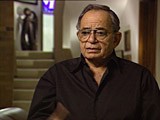You searched for: poland
<< Previous | Displaying results 1376-1400 of 1568 for "poland" | Next >>
-
Yakov Biber
ID CardYakov was the youngest of four children born to a poor religious Jewish family in the village of Matsiov in Ukraine. Six years after Yakov was born, Matsiov was ceded to Poland. When Yakov was 14 his mother died and he had to quit school in order to work. Yakov was a Zionist and hoped to settle in Palestine [Yishuv]. 1933-39: In the Young Pioneers, a Zionist group, Yakov directed the dramatic productions the group put on to raise money for the Zionist cause. It was in the Young Pioneers that he met Chava,…
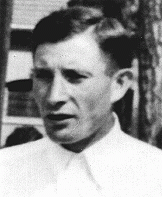
-
Barbara Nemeth Balint
ID CardBarbara was born to a middle-class Jewish family in southeast Hungary. Her father had a store that carried grocery and hardware items. Barbara had a sister named Margit and a brother named Desider. In 1928 Barbara married Istvan Geroe and moved to the town of Torokszentmiklos. Her son, Janos, was born there a year later. 1933-39: In 1933 Barbara divorced and returned with 3-year-old Janos to her parents' home in the town of Szentes. She helped run her parents' store, which was located on a busy inter-city…
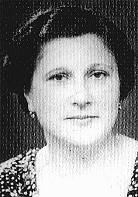
-
Jermie Adler
ID CardThe second of seven children, Jermie was born to poor, religious Jewish parents at a time when Selo-Solotvina was part of Hungary. Orphaned as a young boy, he earned a living by working at odd jobs. In the 1920s he married a woman from his village. Together, they moved to Liege, Belgium, in search of better economic opportunities. There, they raised three daughters. 1933-39: In Liege the Adlers lived in an apartment above a cafe, and Jermie and his wife ran a successful tailoring business. Their children…
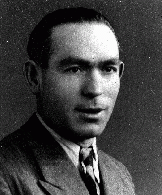
-
Sophie Weisz
ID CardSophie was born to a prosperous Jewish family in a village near the Hungarian border known for its winemaking and carriage wheel industries. The village had many Jewish merchants. Her father owned a lumber yard. Sophie loved to dance in the large living room of their home as her older sister, Agnes, played the piano. 1933-39: Sophie's father believed in a Jewish homeland and sent money to Palestine to plant trees and establish settlements there. When she was 10, she was sent to a school in nearby Oradea…
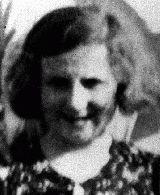
-
Isachar Herszenhorn (Irving Horn)
ID CardIsachar was born to a Jewish family in the Polish city of Radom, approximately 75 miles south of Warsaw. The city was the center of Poland's leather-tanning industry. Isachar's father worked as a salesman for a nearby tanning factory. His father was a successful salesman and the family lived comfortably. 1933-39: During registration for Isachar's first-grade class in 1934, a Jewish boy was pushed down the stairs. When his mother confronted the principal about the incident, all he said was that the boy had…
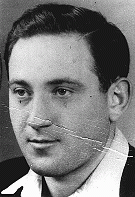
-
Janina Prot
ID CardJanina's parents had converted from Judaism to Catholicism in the 1920s. When Janina was 4 years old, her parents divorced; Janina left Warsaw and went to live with her father near the Polish town of Radom, while her brother Tomas remained in Warsaw with his mother. Janina, or Jana as she was affectionately known, loved to read. 1933-39: When Jana was 12 she moved back to Warsaw to attend secondary school, and stayed with her mother. A year later, on September 8, 1939, the Germans were bombing Warsaw.…
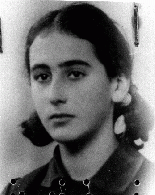
-
Gert Laske
ID CardGert was born to a Jewish family settled in northeast Berlin, known as one of the city's "red" (largely communist) districts. They lived in a large tenement building. Gert's parents were from the eastern part of Germany, which had been ceded to Poland in 1919. His father, proud of his Iron Cross, Second Class, earned in World War I, was active in an association of Jewish veterans. 1933-39: After Hitler came to power, a neighbor told Gert's mother that they couldn't greet each other on the street…
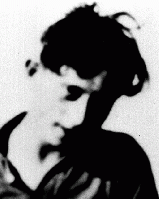
-
Frieda Greinegger
ID CardFrieda was the fourth of five children born to strict Catholic parents. She had one brother and three sisters. Frieda grew up on a large farm near the village of Michaelnbach in northern Austria. The farm had cattle, horses, pigs and poultry, and the children worked long hours helping their parents on the farm. At age 12, Frieda left school to work full time on the farm. 1933-39: Germany annexed Austria in March 1938. When war broke out in September 1939, Frieda's brother was drafted into the German army.…
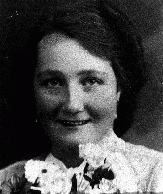
-
Iosif Kirzhner
ID CardIosif was the second of four boys born to a Jewish family in the southern Ukrainian port of Odessa, a city with the largest Jewish community in the Soviet Union before World War II. Iosif's father worked as a hat maker, while his mother raised the family. 1933-39: In 1936 Iosif joined the Red Army and was trained to drive a tank. After Germany invaded Poland on September 1, 1939, the Soviet Union took advantage of its nonaggression pact with the Germans to claim Finnish territory. The Finns resisted them…
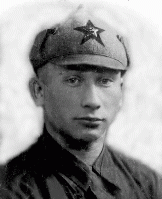
-
Frederic Bernard
ID CardFrederic was born to a Jewish family in Czernowitz (Chernovtsy). His father was head clerk in a lawyer's office and his mother was a pianist. Frederic's parents were active in Czernowitz's sizable Jewish community. In 1930 Frederic began medical studies at the German University in Prague, Czechoslovakia. 1933-39: Frederic left Prague in 1933. He went to France and then Italy to finish his studies and graduated in 1936. He wanted to leave Europe to escape Hitler and tried to do so by applying to the…
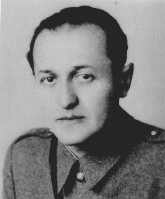
-
Genya Rotenberg
ID CardGenya and her brother, Nahum, were raised by Jewish parents in Lodz, Poland's second-largest city and an industrial center. Before the war, one-third of Lodz's inhabitants were Jewish. Genya's parents placed emphasis on their children's education. 1933-39: In 1939, when Genya was 9, the Germans occupied Lodz. After that, it was forbidden for "Jews, Gypsies and dogs" to be in public places. Since Jews weren't allowed to go to school, her parents arranged to tutor her secretly at home, but she couldn't keep…
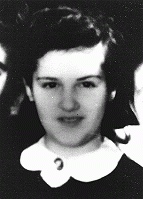
-
Bernard Krakauer
ID CardBernard was one of seven children born to a German-speaking, Jewish family in the small Moravian town of Mikulov in the central part of Czechoslovakia. The family later moved to the town of Hodonin where Bernard opened a dry-goods and clothing store. In 1899 he married Berta Koselova, and the couple had six children. During World War I Bernard served in the Austro-Hungarian army. 1933-39: In 1938 Bernard retired, and since none of his sons wanted to take over the business, Bernard sold it. He, his wife,…
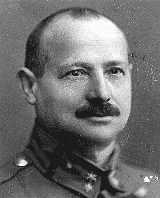
-
Berta Koselova Krakauerova
ID CardBerta was born to a Jewish family. Orphaned when she was a child, she was raised by her Uncle Poldi in Vienna. In 1899 she married Bernard Krakauer, a Jewish businessman from her hometown of Mikulov. As was the custom for orphans, Berta wore a black dress at her wedding. The couple settled in the town of Hodonin, where Bernard opened a dry goods and clothing store. They raised six children. 1933-39: With their children grown, Berta's husband retired in 1938. He sold the business and moved with Berta and…
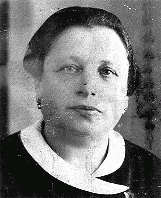
-
Pawel Wos
ID CardPawel, a Roman Catholic, fled to Danzig, Germany, in 1914 to avoid conscription in the Russian army. Since Germany and Russia were at war, Pawel was arrested by the Germans as an enemy alien and sent to work on a farm in northern Germany. He met Anna Szachowska there, and they married in 1918. The couple moved to Warsaw where they raised 4 children. In 1930 Pawel opened a textile business. 1933-39: Despite the Depression, Pawel's business prospered and they expanded their operations. In 1938 some friends…
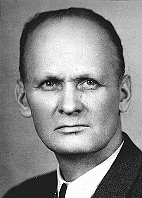
-
Moishe Krol
ID CardMoishe was born to Yiddish-speaking Jewish parents in Radom. The industrial city was known for its armaments factories in which Jews could not work and for its leather industry in which many Jews did. When Moishe was a teenager, he finished school and apprenticed to become a women's tailor. Moishe earned a certificate enabling him to be a licensed tailor and settled down in Radom. 1933-39: By 1939, Moishe had become a master tailor specializing in women's clothes. He remembers local antisemitic…
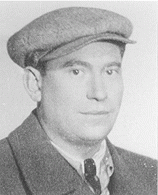
-
Jocheved Kuzda Kasher
ID CardJocheved, or Jadza as she was called at home, was born in the industrial city of Lodz, Poland's second-largest city. Before the war, one-third of Lodz's inhabitants were Jewish. The Kuzdas kept a traditional Jewish home and placed importance on their children's education. Jocheved had two older sisters, Sarah and Regina. 1933-39: Jocheved was 9 when the war broke out in September 1939. Instead of starting school, she stayed at home listening to the bombs exploding. Her father and sister tried to get to…
-
Erika Eckstut
ArticleExplore Erika Eckstut's biography and learn about the difficulties and dangers she faced in the Czernowitz ghetto.
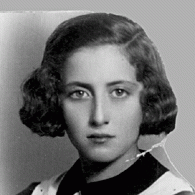
-
Jozef Tiso
ArticleJozef Tiso was a Slovak politician and a Roman Catholic priest. From 1939 to 1945, he was the president of the Slovak Republic, one of Nazi Germany’s allies.
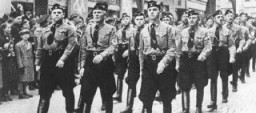
-
Hans Heimann describes Italian aid to Jews
Oral HistoryThe Germans annexed Austria in March 1938. In 1939, Hans fled first to Hungary and then to Italy. He and his parents were interned in various towns. Hans's father became ill and died in 1940. In 1943, Hans and his mother were warned of German plans to deport Jews from Italy to Poland. They moved to smaller towns until liberation by the British in August 1943. Hans worked as an interpreter for the Allies until 1945, when he worked for the American Jewish Joint Distribution Committee and helped resettle…
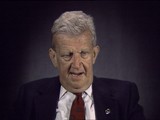
-
Alisa (Lisa) Nussbaum Derman describes joining the Nekama (Revenge) Jewish partisan unit led by Josef Glazman in the Naroch Forest
Oral HistoryLisa was one of three children born to a religious Jewish family. Following the German occupation of her hometown in 1939, Lisa and her family moved first to Augustow and then to Slonim (in Soviet-occupied eastern Poland). German troops captured Slonim in June 1941, during the invasion of the Soviet Union. In Slonim, the Germans established a ghetto which existed from 1941 to 1942. Lisa eventually escaped from Slonim, and went first to Grodno and then to Vilna, where she joined the resistance movement. She…
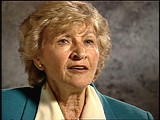
-
Dorotka (Dora) Goldstein Roth describes conditions in the Vilna ghetto
Oral HistoryAfter the Germans invaded Poland in 1939, Dora's family fled to Vilna, Lithuania. When the Germans occupied Vilna, Dora's father was shot and the rest of the family was confined in the Vilna ghetto. Dora, her sister, and her mother were deported to the Kaiserwald camp in Latvia and then to the Stutthof concentration camp near Danzig. Her mother and sister perished in Stutthof. Dora herself was shot immediately before liberation, but she survived.
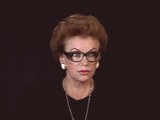
-
Leo Schneiderman describes routine at the Ebensee camp
Oral HistoryThe Germans invaded Poland in September 1939. Leo and his family were confined to a ghetto in Lodz. Leo was forced to work as a tailor in a uniform factory. The Lodz ghetto was liquidated in 1944, and Leo was deported to Auschwitz. He was then sent to the Gross-Rosen camp system for forced labor. As the Soviet army advanced, the prisoners were transferred to the Ebensee camp in Austria. The Ebensee camp was liberated in 1945.
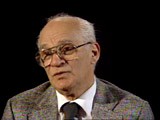
-
Bart Stern describes torture of prisoners during Hanukkah and a subsequent act of resistance to celebrate Hanukkah
Oral HistoryFollowing the German occupation of Hungary in March 1944, Bart was forced into a ghetto established in his home town. From May to July 1944, the Germans deported Jews from Hungary to the Auschwitz killing center in occupied Poland. Bart was deported by cattle car to Auschwitz. At Auschwitz, he was selected to perform forced labor, drilling and digging in a coal mine. As Soviet forces advanced toward the Auschwitz camp in January 1945, the Germans forced most of the prisoners on a death march out of the…
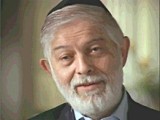
-
Sandor (Shony) Alex Braun describes how music gave him the strength to survive while imprisoned in concentration camps
Oral HistoryShony was born to religious Jewish parents in a small Transylvanian city. He began to learn the violin at age 5. His town was occupied by Hungary in 1940 and by Germany in 1944. In May 1944, he was deported to the Auschwitz camp in Poland. He was transferred to the Natzweiler camp system in France and then to Dachau, where he was liberated by US troops in April 1945. In 1950, he immigrated to the United States, and became a composer and a professional violinist.
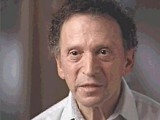
-
Leo Melamed describes life as a refugee
Oral HistoryLeo was seven years old when Germany invaded Poland in September 1939. Before the war, Leo's father was a mathematics teacher and member of the Bialystok City Council. Fearing arrest, Leo's father fled Bialystok for Vilna just before the German occupation. Leo and his mother eventually joined his father in Vilna. After the Soviets occupied Vilna, Leo's father obtained transit visas to Japan. The family left Vilna in December 1940, traveled across the Soviet Union on the Trans-Siberian Express, and arrived…
